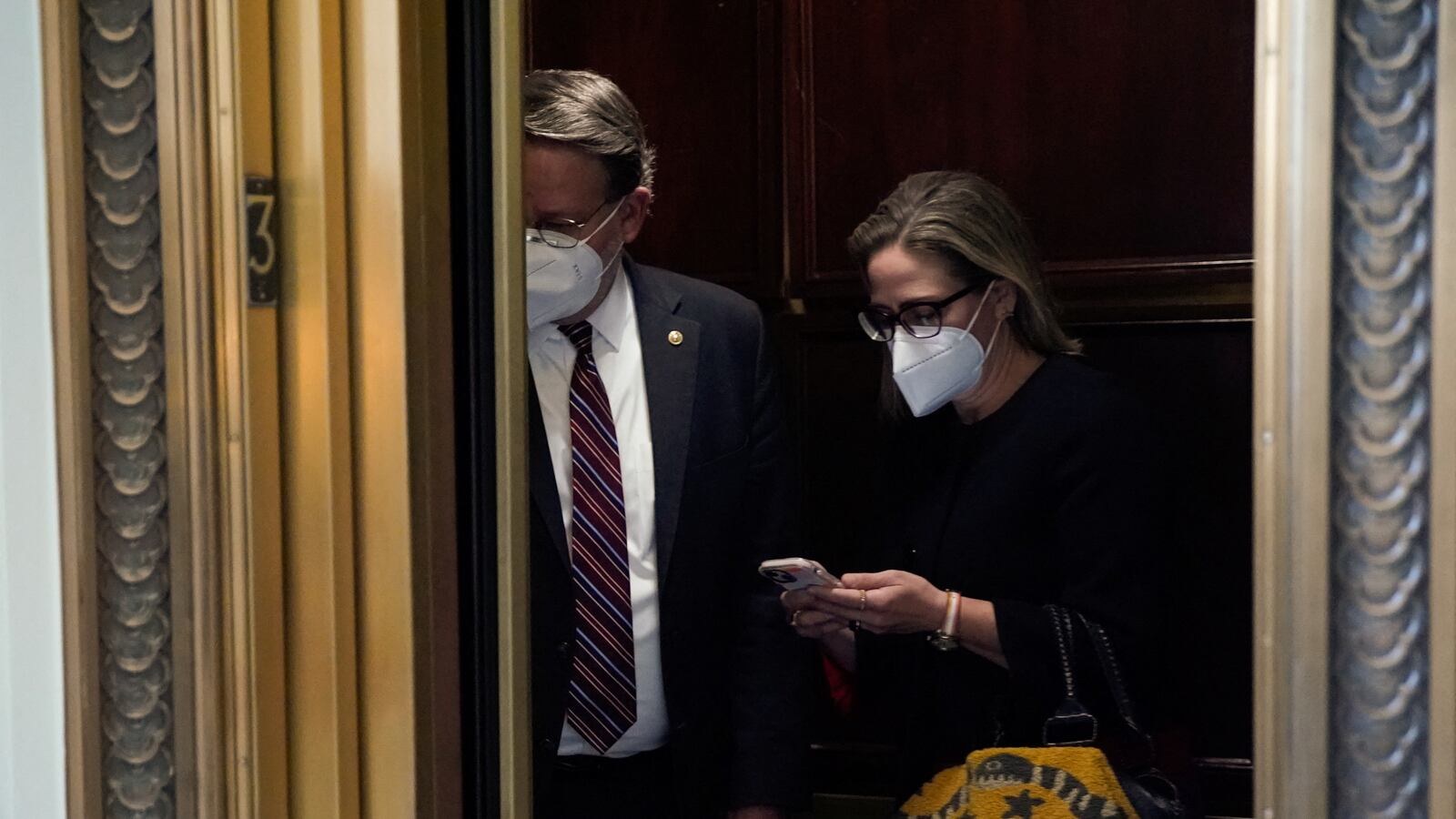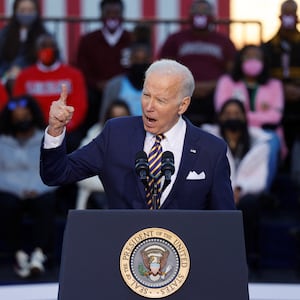Senate Democrats pulled out all the stops this week to try and pass their signature voting rights bills: a presidential visit to the Capitol, impassioned floor speeches, legislative gambits, endless rounds of conversations about rules changes.
None of it is going to work.
The two proposals—the John Lewis Voting Rights Advancement Act and the Freedom to Vote Act— are both aimed at countering restrictive state-level voting laws enacted by Republicans since the 2020 election. But so long as the Senate’s 60-vote threshold for passing bills remains intact, Republicans are guaranteed to be able to block them—which they already did last year.
But minutes before President Joe Biden arrived at his old stomping grounds, Sen. Kyrsten Sinema (D-AZ) made it clear it was a waste of a trip. Speaking to a scarcely populated chamber, she reiterated her stance of supporting the current voting rights proposals but defending Republicans’ ability to tank them.
Sen. Joe Manchin (D-WV)—her partner in inflicting intra-party pain and the only other Senate Democratic holdout for a filibuster exception—called her performance “excellent.”
Emerging from his meeting with senators, Biden conceded he wasn’t sure that Democrats could get something done on voting rights. That doubt was affirmed five hours later, when Manchin issued a statement reiterating his long-standing opposition to eliminating or weakening the filibuster.
None of this should have come as a surprise to Democrats. Indeed, most lawmakers have been clear-eyed about the daunting task of overhauling Senate rules and passing sweeping election reforms with the thinnest possible congressional majorities.
But with critical elections this November set to take place in states with new, GOP-written voting laws, Democratic leaders clearly felt they had no choice but to try. The party’s base, as well as a constellation of activist groups from the NAACP to the ACLU, have pushed Biden and Democratic lawmakers hard in the past year.
As a result, Biden and party leaders continued upping the ante in an unwinnable fight, even pausing consideration of the rest of the party’s (probably similarly doomed) domestic agenda—the Build Back Better Act—to consider voting reforms this January.
The voting rights road to nowhere will likely conclude next week with a failed vote on the Senate floor and, eventually, a debate over changing Senate rules that will feature impassioned speeches but, almost certainly, few meaningful results.
This knowledge seems to be sinking in: Democrats exited their Thursday meeting with Biden at a loss for what might happen next. Asked by The Daily Beast what, at this stage, could shake up Democrats’ stalled dynamic on voting legislation, Sen. Tina Smith (D-MN) paused a beat.
“I don’t know,” she said. “I don’t know.”
Sinema’s speech—timed to maximize its effect—particularly stung Democrats from Capitol Hill to the White House.
Most Senate Democrats declined to engage much with their Arizona colleague’s move. “I think it just speaks for itself,” said Sen. Richard Blumenthal (D-CT). “I can't really say more.”
The White House did not immediately respond to questions about Sinema’s remarks, although one longtime Biden advisor messaged The Daily Beast roughly halfway through her remarks that the president was likely “spitting bullets” over the perceived disrespect of delivering a speech torpedoing his agenda only minutes before he was set to address the caucus.
“Just colossally disrespectful,” the longtime advisor said. “It’s a middle finger, and it’s frankly unimaginable to someone who spent four decades in the Senate.”
Although White House press secretary Jen Psaki told reporters that she would not “get into any private conversations” between Biden and Sinema, those on the staff level were blindsided by the Arizona senator’s remarks until they were first reported on Twitter.
Within the West Wing, the collapse of Biden’s push for filibuster reform came amidst a torrent of bad news, including a Supreme Court decision striking down his nationwide vaccine and testing mandate for large businesses. One person familiar with the internal response to the Arizona senator’s remarks only sent a red-faced swearing emoji; another summed it up as “ughhhhhhhhhhh” with eleven H’s.
Still, several lawmakers said that despite the long odds, the voting rights debate is one worth having in the public sphere, given the enormous stakes on the ground in a number of states.
Sen. Raphael Warnock (D-GA) told The Daily Beast full consideration of voting rights is long overdue. “We have been having this discussion about voting rights for some time now. And it's time to vote,” he said.
Warnock’s home state of Georgia has been ground zero for voting-rights rollbacks, particularly targeting Democrats’ base voters in the state. In 2021, the state legislature passed a new law limiting ballot access and making it illegal to give voters water while waiting in long lines, among other changes.
Those rules will be in effect when Warnock is on the ballot again this fall. His race is a toss-up, according to the Cook Political Report.
Sen. Angus King (I-ME), who once opposed changing the Senate’s 60-vote threshold but changed his mind on voting rights, told The Daily Beast on Thursday that the upcoming vote on election bills will actually get a debate on the Senate floor, unlike last year.
“That’s something we haven't been able to even get to the floor for the past six months,” King said. “So I think we're in sort of new territory, where the other side is going to have to actually come to the floor and debate.”
But Republicans, especially Senate Minority Leader Mitch McConnell (R-KY), have had no reservations about attacking Democrats’ voting rights proposals, even if Democrats are convinced doing so is politically toxic for the GOP.
There is one potentially meaningful election reform that Republicans—even McConnell—have warmed to. It involves reforming the Electoral Count Act, which dictates how electoral college votes are counted—and permits members to object to their counting for whatever reason, legitimate or not.
The obscure law has emerged as a target for an overhaul because of how Donald Trump and his followers meant to exploit it as they sought to overturn the 2020 election. The statute is vague about the vice president’s role in certifying the election results, which was the focus of the Jan. 6 attack on the U.S. Capitol.
Proponents say reforming the law could help head off another Jan. 6 while clarifying the electoral vote-counting process at a perilous time. A bipartisan group of senators, including Manchin and Sinema, have met in the last week to discuss changing the law.
But most Democrats seem content to leave this viable reform on the table—at least for now. Many lawmakers, and outside liberal groups, have framed reforming the ECA as a McConnell-backed gambit to stymie broader election reforms like the Freedom to Vote Act.
To them, it’s a cop-out from substantive voter protections.
“The Electoral Count Act and the public policy debate of that law might be a worthy discussion… But it is absolutely, positively not a substitute for passing these two bills,” Rep. Pete Aguilar (D-CA) said on Thursday.
Republicans who support reforming the ECA do not understand why Democrats would not seize on an opportunity to fix an aspect of the process that Trump sought to exploit.
Rep. Peter Meijer (R-MI), who voted to impeach Trump after Jan. 6, said it was “baffling” that Democrats were reluctant to take up a change that would “actually address… the weaknesses that were exposed on January 6.”
And there are plenty of Democrats, aside from Manchin and Sinema, who are in favor of moving forward with ECA reforms. Rep. Don Beyer (D-VA) said he was not sure why other Democrats seemed so reluctant to take up the mantle.
“The fact that there’s bipartisan interest in it is really excellent,” Beyer said.
Though Democrats don’t have many details on exactly how they might advance the voting rights fight after their proposals fail again next week, key players are signaling it will happen.
Asked about contingency plans, Warnock said, “We will continue to fight and I won't rest until we get this done.”
Publicly, the president’s communications team pitched Thursday’s setback as an it-ain’t-over-’til-it’s-over situation, noting that a vote on the twin election-access bills had yet to be held.
“We’re gonna keep fighting until the votes are had,” Psaki told reporters when asked if the president had given up on winning over Sinema and Manchin’s support for filibuster reform. Biden, Psaki said, “knows that he was elected to do hard things and advocate for hard things.”
Biden echoed that sentiment on Thursday.
“I don’t know that we can get it done, but I know one thing: as long as I have a breath in me, as long as I am in the White House… I’m going to be fighting to change the way these legislatures have [been] moving,” he said.




